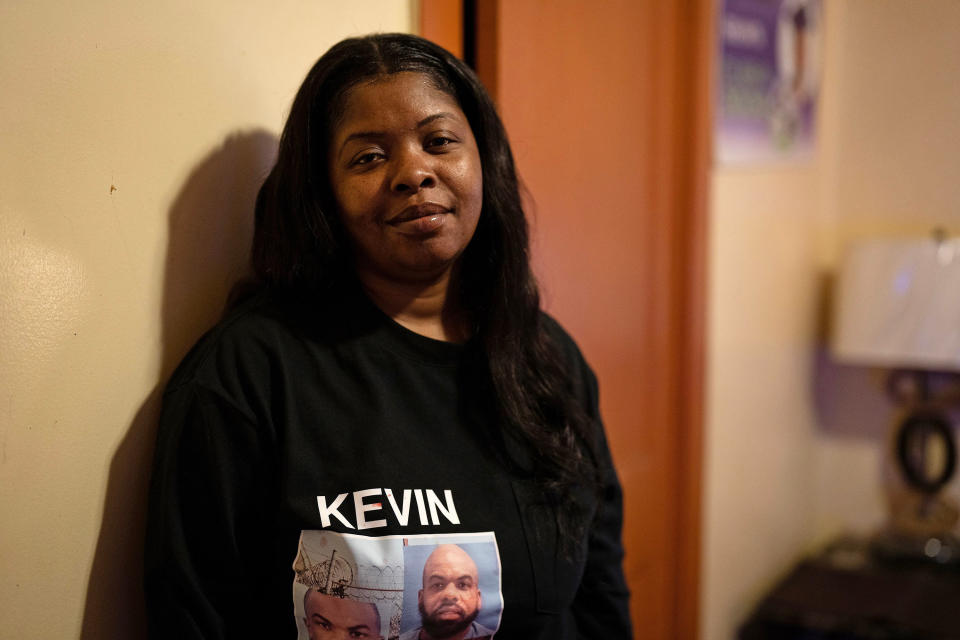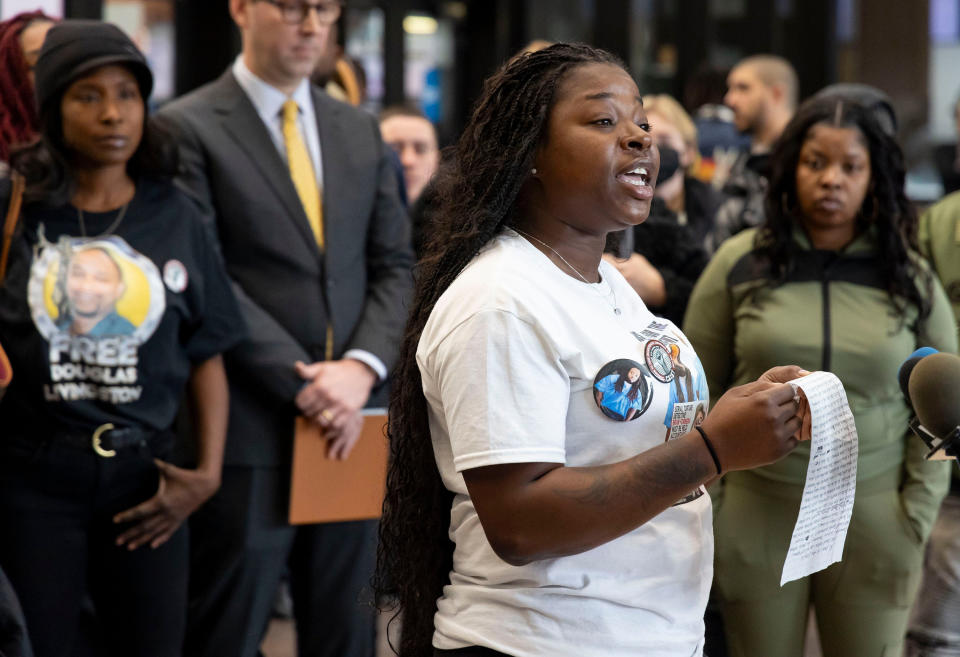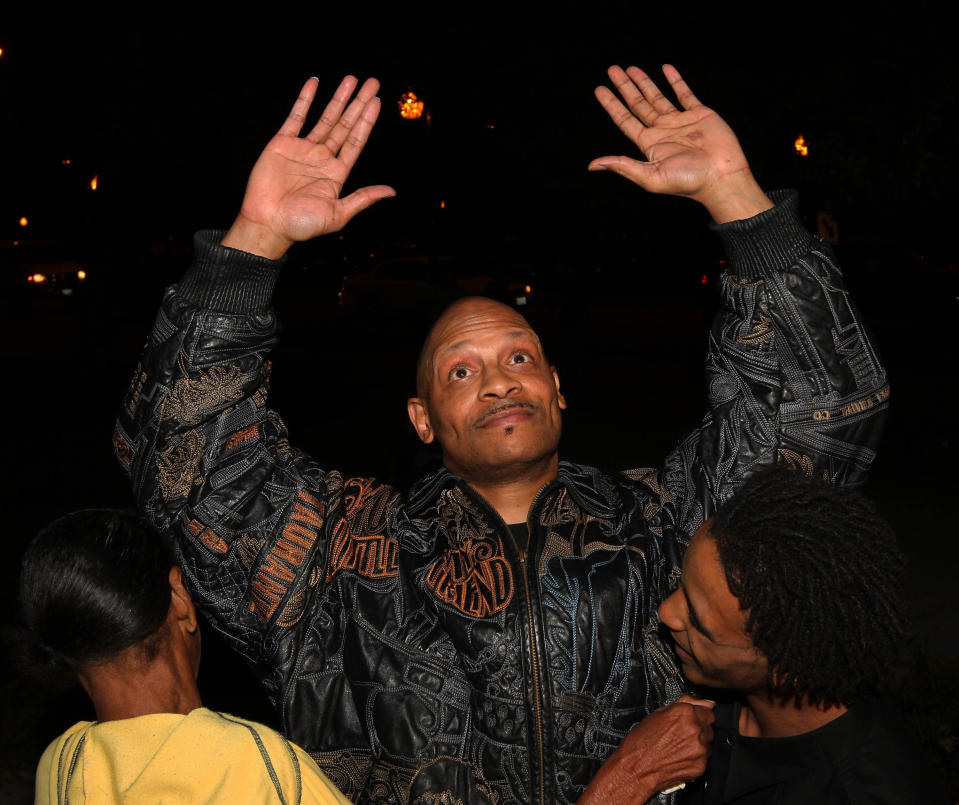Retired CPD detective draws complaints alleging misconduct including witness coercion
On Memorial Day weekend in 2006, Kimberly Harris was home with her 17-year-old son when she said she heard a barrage of gunfire nearby.
The shooting at West 85th and South Honore streets left one person dead. Though she didn’t know it at the time, the act of violence would also alter the course of her life and that of her teenage son.
Word soon began circulating that her son, Andre Mosley, was the shooter, Harris said, though she believes the actual killer was a relative. When the shots were fired, her son was home playing video games with a friend, she said. She felt he had nothing to hide.
So when she learned detectives were looking for him, she took him to the police station hoping he would be quickly cleared. Instead, the teenager never came home.
Mosley was convicted of murder largely on the initial statements of a witness to the shooting, who at trial recanted his testimony and told the jury his statement was coerced by detectives, according to trial transcripts.
He identified Mosley as the shooter after about 30 hours in custody in which he said he was handcuffed, given only a breakfast sandwich and threatened to be charged with the crime himself if he did not name Mosley, according to a post-conviction petition filed by Mosley.
One of the detectives in question — Brian Forberg, who retired last year — has become a flashpoint at the Leighton Criminal Court Building of late, with multiple protests springing up and drawing attention to his cases. Defense attorneys have identified at least a dozen defendants who have accused Forberg and other detectives of misconduct, including coercing witnesses into falsely implicating people in murders and other serious felonies.
A review of hundreds of pages of court documents and police complaints revealed repeated allegations of coercion, including withholding food and water, threatening to take away children and, in the most serious cases, allegations of beatings.
Further, the so-called Forberg cases have raised concerns about conflicts of interest in the Cook County state’s attorney’s office because Forberg was married to an assistant state’s attorney who, per documents filed by the office, worked closely with the Conviction Integrity Unit, which has been tasked with investigating allegations of misconduct on behalf of Forberg.
The unit, which examines potential wrongful convictions, has since been renamed the Conviction Review Unit. Reached by phone, Forberg said he had no comment.
A spokeswoman with the state’s attorney’s office confirmed that the office’s Conviction Review Unit is examining two Forberg cases — Mosley’s and the case against Kevin Jackson — but said the office couldn’t comment further. A spokeswoman with the Chicago Police Department declined to comment, citing pending litigation.
“It’s not surprising that state’s attorneys would fraternize with police detectives because they do work together all the time,” said Elizabeth Bacon, an attorney handling one of the cases. “The problem is a complete lack of sensitivity and frankly professional ethics in terms of separating these conflicted attorneys from matters that come before the state’s attorney’s office.”
‘Closers’
Forberg was hired by the Chicago Police Department in 1995, launching a nearly three-decade career there, and he retired in October, according to state law enforcement records.
As a detective, Forberg and his often partner John Foster were known as “closers,” Bacon said, with the department bringing them in on difficult cases. Records show the detectives collaborated on cases throughout the 2000s, their work bringing in convictions, many of which were reliant on eyewitness testimony.
Their convictions have been under increasing scrutiny, though, beset by accusations of misconduct in civil and criminal complaints and motions in multiple cases.
Among the allegations:
— Following his detention in 2001 connection to a homicide, Gregory Minniefield alleged, according to court documents, that he was taken into custody by Forberg and Foster, then beaten by Foster after attesting that he did not want to speak to police without a lawyer. He said Foster put a phone book against his chest and punched him until he threw up and started wheezing. Foster denied the allegations at the time, according to transcripts.
“How many times do you think he punched you?” his attorney asked during a hearing to suppress statements he made to police. Minniefield replied, according to the transcript, “A good four or five times,” adding that he told the detectives that he couldn’t breathe.
Minniefield is serving a 50-year sentence for murder.
— A woman questioned in connection with a 2006 shooting death alleged in a lawsuit filed against the city that she urinated in an interrogation room after many hours of questioning by Forberg and his partner at the time, Kevin Eberle. The detectives, though, maintained that they told her she could take bathroom breaks, according to court documents. After telling the investigators that she did not see her sister shoot the victim, the woman, Lisa Rhodes, eventually changed her story and implicated Sara Bridewell after hours of questioning, according to a ruling by a federal judge in favor of the city. The suit for wrongful arrest was filed after prosecutors dropped charges against Bridewell upon finding problems with the case, the ruling said.
— In a civil suit filed against the city, Maurice Patterson, who spent eight years in prison for murder but later was exonerated, alleged that Forberg and other officers coerced witnesses into implicating him, including a woman who said she was held for three days during which she was deprived of food, water and sleep. The officers intentionally allowed her to overhear which lineup number would ID Patterson, the suit alleged. He settled with the city for $3.4 million.
Forberg has also been named in nearly three dozen complaints, though the vast majority were not sustained. The complaints range from beatings to arbitrary stops and searches.
At least one involved a complainant who was hospitalized after being questioned by Forberg and Foster while temporarily released into their custody from the Cook County Jail in September 2004. The complaint says that when the inmate was transferred back to the jail after being questioned by police, he was denied reentry and instead taken to the hospital for treatment of injuries to his hand. The inmate told investigators with the Office of Professional Standards that he was beaten by officers while in custody.
The report notes that photographs show no signs of injury before the interrogation, but indicated swelling, redness and bruising to his hand after he was in CPD custody.
Forberg and Foster denied injuring him or seeing any signs of injury, the report said.
The office determined the allegations were unfounded, writing: “Although (redacted) was released from Cook County Jail with no injuries, and returned with injuries, it is unclear how (redacted) sustained the injury.”
‘I’ll take a lie-detector test’
Quina Davis was at a Citgo gas station at 55th Street and Damen Avenue in the early morning on May 6, 2001, when she was shocked to see someone she knew as a Gangster Disciple come out of the station in an area widely thought of as Vice Lords territory, she said.
Her gut instinct told her not to get out of her car, and shortly after, she heard gunshots. The alleged Gangster Disciple escaped without injury, court records say, but two others were shot, including a 54-year-old man who died from his injuries.
She called 911 and gave a statement to officers at the scene. Though she saw the shooter — someone known to her — she held back that detail out of fear of reprisal, she told the Tribune.
Because she had the misfortune to witness a homicide, Davis said, she became the subject of a harassment campaign by Foster and Forberg, as they continually showed up at her mother’s house, causing her to move out.
Eventually, she was held in custody for three days, but refused to sign a statement that implicated Jackson, their suspect.
In tears, she offered to do a polygraph test, according to Davis and court records. She was taken to a West Side location to take the test, and she said the detectives told her she failed it afterward. Special prosecutors reinvestigating the case on behalf of the state’s attorney’s office, though, used an expert to review the results of Davis’ polygraph exam. The expert found that Davis’ responses “indicated truthfulness,” a report said.
“I’m so hysterical, I said, I’ll take a lie-detector test because I know I wasn’t lying,” she said.
She maintained to the detectives that Jackson, with whom she was acquainted, was not at the Citgo on the day of the shooting. Four other witnesses, though, gave statements that implicated Jackson. All of them later recanted at trial, alleging coercion, including a pregnant woman who said the detectives threatened that she’d give birth to her child in jail and lose custody if she didn’t name their suspect, according to court documents.
In response, prosecutors introduced into evidence the witnesses’ signed statements and grand jury testimony, as permitted by Illinois law. A jury convicted Jackson, and he was sentenced to 45 years in prison.
“We turn around and blame these communities for not coming forward when they witness a crime. Well, why would you?” said Brandon Clark, one of Jackson’s lawyers. “You’ll either get harassed by police because you won’t name the person they want you to, or police aren’t going to get the right person.”
An Illinois appellate court in 2021 denied Jackson the right to file a post-conviction petition, but still raised concerns about the allegations of police misconduct in the case.
“I write separately because I am deeply troubled by the recurrence of complaints of serious misconduct by police officers against witnesses and defendants in criminal cases,” Supreme Court Justice P. Scott Neville wrote in a concurring opinion. “Such allegations call for corrective action to ensure that the methods employed by police in the investigation and prosecution of criminal offenses are both fair and appropriate.”
But since that rejection, Jackson’s quest for exoneration has heated up in recent months.
His case was reinvestigated by special prosecutors on behalf of the Conviction Integrity Unit after his attorneys raised concerns to Foxx about Forberg’s marriage to a prosecutor who worked in the unit.
Jackson is still waiting for a resolution, though.
His sister, Lakisha Jackson, was 15 years old when her brother was arrested. She said she not only lost a brother, but a parental figure who did her braids and cooked meals when her mother worked.
She’s frustrated with the witnesses who implicated her brother, but has been urged by her brother to forgive them, she said.
“Every day, he tells me he’s sorry,” she said of one of the witnesses. “I try to forgive him every day.”
‘He said my son didn’t do it’
Testifying in front of a jury in November 2007, Bryant Anderson, then 19, told prosecutors he was handcuffed behind his back, not allowed to sleep in a bed or use the bathroom and was given one sandwich in a daylong period during an interrogation involving Forberg, according to a trial transcript.
Anderson testified that he implicated Mosley, a teen he had known for a few weeks, because Forberg told him he would get charged if he didn’t give a name.
“Did you see Andre Mosley at the crime scene?” Mosley’s attorney asked at trial.
“No I didn’t,” Anderson replied.
Mosley’s attorney asked Bryant why he changed his story, referencing a signed statement and grand jury testimony that conflicted with the account he gave the jury.
“I don’t feel, I don’t, it’s not, I don’t feel right saying somebody did something they didn’t,” he replied.
Harris, Mosley’s mother, remembers watching this testimony unfold in the courtroom.
“He said my son didn’t do it,” Harris said.
She was dismayed when the jury convicted him anyway. She remembers one of the jurors crying as the panel entered the courtroom to read the verdict. He was sentenced to 57 years in prison.
Largely the only other evidence presented, according to court documents, was testimony from a woman who said she overheard Mosley talking about the shooting, though his attorneys have argued that his original lawyers failed to present witnesses that would have contradicted her statement.
Harris called the mayor, lawmakers, anyone with influence who could help her son. She said he was a quiet boy, still playing with Pokemon cards.
“It’s like my life has stopped,” Harris said.
She blames the detectives and other points of failure in the criminal justice system, but her voice breaks as she describes her own remorse at taking her son to the police station thinking they would clear him.
“I knew he was innocent,” she said. “And I knew they had nothing on him.”
A conflict
Mosley continues to fight for his release, and it was during his post-conviction proceedings that Forberg’s marriage to the assistant state’s attorney first came out.
In a motion filed on March 15, 2022, the state’s attorney’s office asked a court to appoint special prosecutors because of the marriage between Forberg and an assistant state’s attorney.
The prosecutor, Kirsten Ann Olson, died shortly after that, in May 2022, according to an obituary that identifies her as Forberg’s wife and an assistant state’s attorney.
The office’s motion says that Olson worked closely with the Conviction Integrity Unit, and noted allegations of misconduct against Forberg.
Jeanette Samuels, Mosley’s attorney, also successfully petitioned the court for a special prosecutor. Samuels said the relationship was uncovered when another prosecutor learned of the connection and informed the court.
“To find out that she essentially was working in a unit where they were reviewing complaints against this guy all the time … there should have been a conflict check,” Samuels said.
Samuels informed attorneys handling other Forberg-related cases about the conflict, including those in Jackson’s case, which had been reviewed and rejected by the Conviction Integrity Unit.
Bacon and Clark reached out to the state’s attorney’s office raising concerns, and First Assistant State’s Attorney Risa Lanier offered a re-review of the case by special prosecutors Thomas Geraghty and Robert Owen, which resulted in a more than 14-month investigation, they said.
In recent days, the attorneys received a heavily redacted version of the report from Geraghty and Owen, who re-interviewed the witnesses in the Jackson case and found that they gave accounts of coercion that were consistent with their prior statements and affidavits. The report noted at least nine other cases with documented allegations of witness coercion by Forberg.
At a hearing Wednesday, prosecutors told a judge they are withdrawing their opposition to the defense motion that petitions for the convictions to be vacated.
New to the case, Judge Angela Petrone said she was not willing to vacate a murder conviction without further acquainting herself with the evidence. She set a court date for February.
Family members watching in the gallery let out cries of frustration.
____



